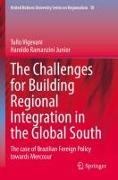Ulteriori informazioni
This book analyzes regional integration in South America with a focus on the Mercosur and Brazilian foreign policy from the 1990s. It reviews the history of the Mercosur and identifies the results achieved by the bloc, as well as the causes of difficulties and the reasons for stalemates over nearly 30 years of its existence. The authors identify the complex interrelation between domestic and foreign factors that have shaped Brazilian foreign policy. From 1991 onwards, relations between Latin American countries have changed while the Mercosur developed from a free trade area to a customs union. While intrabloc trade grew, there were huge difficulties in the form of regional institutional affirmation and cooperation. This history is of the utmost importance to understanding regionalism and politics in Latin America. The book therefore has two interrelated analytical dimensions: namely, focus on ideas and identity; and behavior, actions, and economic and political interests. Thisvery topical book is of interest for researchers and students of Brazilian foreign policy and those of Latin American and/or Mercosur countries. Particularly, readers interested in regionalism will find important theoretical and empirical elements in this book, as well as discussions necessary for comprehending the role of big, emerging countries, and the potential and limits to their international role.
Sommario
Chapter 1: Latin American integration: a Brazilian view.- Chapter 2: Brazilian thought and regional integration in the 20th century.- Chapter 3: The role of regional integration for Brazil: autonomy, universalism, and the elite´s perception.- Chapter 4: The social Mercosur.- Chapter 5: The Mercosur structural dimension: economic and political/diplomatic features.- Chapter 6: Mercosur, Unasul, and CELAC relations.- Final considerations: What is the future of the Mercosur? Where did it come from, where is it, and where is it headed? Main challenges.
Info autore
Tullo Vigevani is Emeritus Professor of Political Science and International Relations at São Paulo State University (UNESP), Brazil. He has published articles in Journals of many countries (Brazil, Argentina, Uruguay, Mexico, China, Israel, United States, Italy, France, etc) chapters and 14 books, as author or editor. He is a Researcher at the Center for Contemporary Culture Studies (CEDEC) and at the National Institute of Science and Technology for Studies of the United States(INCT-INEU). He participates in numerous Editorial Boards. His most frequent subjects of research are regional integration, Brazilian foreign policy, United States and Internationa l Trade Regimes.
Haroldo Ramanzini Junior is an Associate Professor at the Federal University of Uberlândia (UFU), Brazil and a Researcher at the Center for Contemporary Culture Studies (CEDEC) and at the National Institute of Science and Technology for Studies of the United States(INCT-INEU). In 2017-2018 he was a Visiting Scholar at the Harvard Kennedy School. His research interests focus on Brazilian Foreign Policy, Foreign Policy Analysis, Comparative Regionalism and International Institutions.

